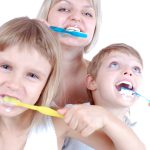Is Having Bad Teeth Genetic?

While dental hygiene is the most important factor in making sure your smile stays healthy, there is some evidence that your genes could affect your risk of developing tooth decay or gum disease. If your parents have bad teeth, then you may have a higher than average risk of suffering from the same problems yourself, but you can still make a big difference to your teeth through good dental hygiene and a healthy diet.
What part in tooth development do genetics play?
The shape and positioning of your teeth is genetically predetermined. However, modern dentistry and orthodontics provides many solutions to straighten out your smile. From near-invisible clear braces to crowns for crooked teeth, you can improve on what nature gave you to create the smile you really want.
Tooth genetics and dental health
The relationship between genes and dental health is more complex. Dental decay is caused by bacteria, which are present in the mouths of all humans regardless of their individual genetic makeup. However, your genes can affect how well the defence mechanisms in your mouth are able to fight back against the bacteria.
Genetics and Cathepsin C
A study in the journal Nature Genetics showed that some people have a genetic mutation that causes them to produce lower levels of a protective enzyme found in saliva. The enzyme, known as cathepsin C, plays an essential role in fighting infections of the gum tissue. People who are genetically programmed to produce less cathepsin C therefore have a higher risk of gum disease, which can lead to teeth needing to be extracted. However, experts say that by adopting good oral hygiene habits, even people whose genes put them at high risk of gum disease can delay the onset of the condition by years or even decades.
There is some evidence to suggest that your genes could bear some responsibility for any problems you may have with your teeth. But the take-home message is clear: whatever your genetic code, you can minimize your risk of dental health problems by keeping your teeth clean, eating a healthy diet that avoids the sugars that bacteria love to feast on, and visiting your dentist for regular examinations.
Reference
http://www.cbsnews.com/2100-204_162-72408.html (news article)
http://www.nature.com/ng/journal/v23/n4/full/ng1299_421.html (original study)
Recent Posts
Categories
Search
Book Your Checkup Today!

Quick Links
Contact Us
123 Kerrisdale Dental Centre
2899 West 41st Ave. Vancouver, BC
Email: info@kerrisdaledentist.com
Phone: 604 263 7355
2899 West 41st Ave. Vancouver, BC
Email: info@kerrisdaledentist.com
Phone: 604 263 7355
Our Hours
- Mon:-
- -
- -
- - Every Other Thursday 8:00 AM to 5:00 PM.
- -
- Closed
- Closed
123 Dentist Member
 At Kerrisdale Dental, we’re very proud and fortunate to be members of BC’s own 123 Dentist – Community Dentist Network.
At Kerrisdale Dental, we’re very proud and fortunate to be members of BC’s own 123 Dentist – Community Dentist Network.Click here to learn more about the 123 Dentist network
Copyright Kerrisdale Dental ©
